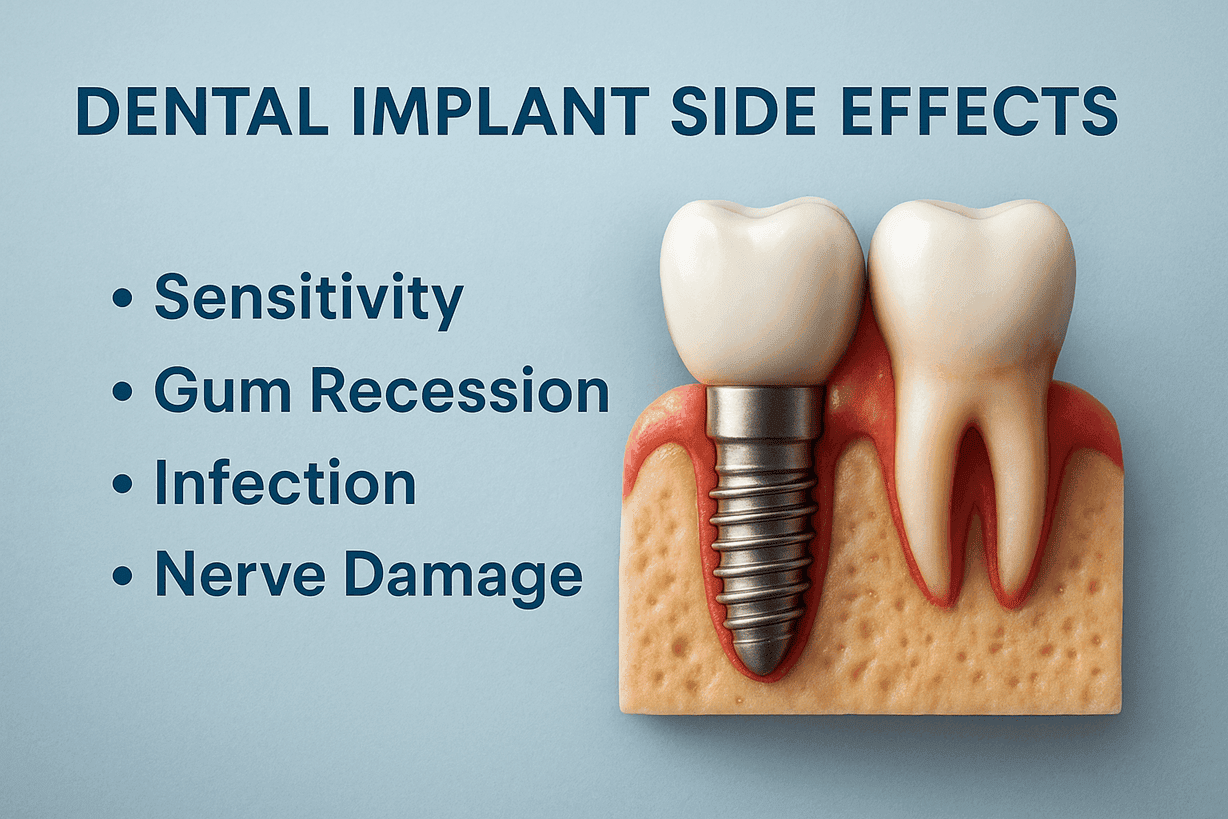Dental Implant Side Effects: How to Reduce Sensitivity Effectively

Understanding Dental Implant Side Effects
Dental implants are among the most effective solutions for missing teeth, restoring both smile and confidence. However, dental implant side effects, such as sensitivity, can be challenging. This discomfort ranges from mild sensitivity to sharp pain while consuming hot or cold foods. If you have experienced this, you are not alone. Feeling sensitivity after an implant is common. This guide explains what are side effects of dental implants, why they occur, and how to reduce them effectively for long-term comfort.
What Are Common Dental Implant Side Effects?
Dental implant side effects can vary from temporary discomfort to long term side effects of dental implants. Unlike natural teeth, implants do not have nerves, but surrounding tissues do, leading to sensitivity especially during healing.
One common cause is inflammation. After implant surgery, gums and bone begin osseointegration, where the implant fuses with bone, often causing temporary sensitivity. Gum recession can also expose implant threads, especially in front teeth (esthetic zone), increasing discomfort. Sometimes, referred pain from nearby teeth can feel like it is coming from the implant site.
Excessive biting force or poor bite alignment can overload the implant, causing sensitivity. Teeth grinding (bruxism) further aggravates this. In some cases, if an implant is placed too close to a nerve, it may result in pain, tingling, or numbness. Infections such as peri-implantitis due to poor oral hygiene can cause inflammation and discomfort. Although rare, allergic reactions to titanium can cause inflammation and sensitivity. Additionally, systemic conditions like diabetes slow healing, increasing the risk of dental implant long term side effects such as chronic sensitivity or implant failure.
Cause | Description |
Inflammation | Natural response to surgery, causing pressure on nerves. |
Gum Recession | Exposes implant threads, increasing sensitivity. |
Adjacent Teeth | Referred pain or overlapping sensations from sensitive nearby teeth. |
Implant Overload | Excessive biting force or poor bite alignment putting pressure on the implant. |
Nerve Irritation or Damage | Implant placed near nerves causing pain, tingling, or numbness. |
Peri-implantitis and Peri-implant-mucositis | Infection around the implant due to poor oral hygiene. |
Allergic Reaction | Rare sensitivity to titanium causing inflammation. |
Underlying Medical Conditions | Conditions like diabetes impairing healing and increasing risk. |
Managing Sensitivity Dental Implant Side Effects Treatment
Although side effects of dental implant surgery can be uncomfortable, there are effective ways to manage them at home. Maintaining excellent oral hygiene is crucial. Using a soft-bristled toothbrush to clean around the implant and special floss or brushes for implants helps prevent plaque build-up. Rinsing with an antimicrobial mouthwash like chlorhexidine, as advised by your dentist, reduces bacteria levels.
Desensitizing toothpaste containing potassium nitrate and fluoride can help. Applying it directly onto the sensitive area before rinsing often provides relief. Modifying your diet is equally important. Eating soft, non-acidic foods minimises pressure on the implant site, while avoiding extremely hot, cold, or crunchy foods prevents discomfort. Applying a cold pack on your cheek near the implant area can help reduce inflammation, and rinsing with lukewarm saltwater soothes irritated gums and supports healing.
Avoiding smoking and excessive alcohol consumption is essential, as both hinder healing and increase the risk of infections. Managing stress is also important, as stress often leads to teeth grinding, which puts extra pressure on the implants.
When to Seek Professional Help
If home care does not reduce your sensitivity, professional treatment becomes necessary. Your dentist may recommend an occlusal adjustment to correct your bite alignment and ensure even force distribution. Gum grafting can restore gum tissue to cover exposed implant threads. For infections like peri-implantitis, deep cleaning or antibiotics may be required. If nerve irritation is causing pain, nerve block injections or medications might be suggested. Rarely, corrective surgery may be needed if implant positioning is incorrect. Laser therapy can reduce inflammation and promote healing, and your dentist may apply desensitizing agents like fluoride varnish or potassium oxalate to block nerve pain signals.
Treatment | Description |
Occlusal Adjustment | Corrects bite to distribute forces evenly across teeth and implants. |
Gum Grafting | Restores gum tissue to cover exposed implant threads. |
Peri-implantitis and Peri-implant-mucositis Treatment | Cleans implant surfaces and treats infection with medications or cleaning. |
Nerve Block/Medication | Manages pain from nerve irritation or damage. |
Implant Revision | Corrects implant positioning if flawed. |
Laser Therapy | Reduces inflammation and promotes healing around the implant. |
Desensitizing Agents | Application of fluoride varnish or potassium oxalate to reduce sensitivity. |
Preventing Long Term Dental Implant Side Effects
To prevent dental implant risks and side effects in the future, it is essential to choose an experienced implant specialist. Proper planning and placement reduce risks significantly. Following post-operative care instructions from your dentist is critical for optimal healing and implant success. Maintaining consistent oral hygiene by brushing, flossing, and using mouthwash helps keep your implants healthy.
Scheduling regular dental check-ups ensures early detection of any potential issues. If you grind your teeth at night, using a night guard protects implants from excessive force. Eating a balanced, nutrient-rich diet supports bone health and healing. Avoiding tobacco products, whether smoking or chewing, significantly reduces the risk of implant failure. Managing systemic conditions like diabetes helps promote proper healing. Most importantly, communicate any discomfort or unusual symptoms to your dentist without delay to ensure timely intervention.
Conclusion: Towards a Comfortable Dental Implant Experience
Sensitivity is a common dental implant side effect, but with proper care and timely professional help, it is manageable and often temporary. Understanding what are side effects of dental implants and addressing them early ensures your implants remain healthy and functional for years to come. If sensitivity persists, consult your dentist promptly. With expert guidance and diligent care, you can continue enjoying the benefits of dental implants confidently and comfortably.

